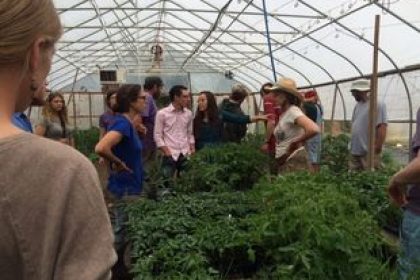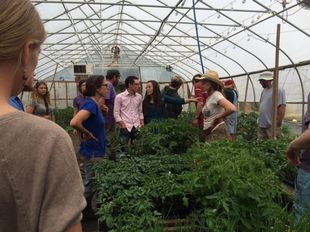
This post, written by Maria Buteux Reade, was reposted from Vermont Farm to Plate Features.
 A group of farmers gather in a pasture and stare intently at a young man struggling to push a long probe deep into the ground. He shakes his head sheepishly and hands off the penetrometer to the next volunteer. No luck for her either. The host farmer steps forward and states matter-of-factly, “That’s what happens when you drive tractors over pastures instead of sticking to the dirt roads.” Welcome to Soil Compaction 101, brought to you by CRAFT.
A group of farmers gather in a pasture and stare intently at a young man struggling to push a long probe deep into the ground. He shakes his head sheepishly and hands off the penetrometer to the next volunteer. No luck for her either. The host farmer steps forward and states matter-of-factly, “That’s what happens when you drive tractors over pastures instead of sticking to the dirt roads.” Welcome to Soil Compaction 101, brought to you by CRAFT.
The Collaborative Regional Alliance for Farmer Training (CRAFT) program began in 1994 in the Hudson Valley and Western Massachusetts. In 2011, the Northeast Organic Farming Association of Vermont (NOFA-VT) launched CRAFT in Rutland and Bennington counties as a pilot project to foster new farmers. Enid Wonnacott, Executive Director of NOFA-VT, said “The goal of CRAFT in Vermont is to generate a bigger pool of skilled agricultural laborers who will not only serve current farm employers but will eventually graduate to independent farm ownership.” NOFA secured funding from the Vermont Working Lands Enterprise Initiative and as of 2016, Vermont now has five CRAFT chapters under the auspices of several parent organizations: NOFA-VT, Rutland Area Farm and Food Link (RAFFL), and Vital Communities in the Upper Valley. Regions served include Rutland, Bennington, and Addison counties, the Upper Valley, and the Brattleboro area. In addition to developing new farmers, CRAFT builds community and encourages collaboration among participating farmers who see one another as peers rather than competitors.
Growing the next generation of farmers, particularly the development of internship/apprenticeship programs that lead to careers in the food system and strategies which address business planning and technical assistance, are both goals of Vermont’s Farm to Plate food system plan. The CRAFT model is helping Vermont reach these goals by providing an opportunity for seasoned farmers to share their wealth of knowledge with aspiring farmers and by encouraging these apprentices and interns to attend the monthly sessions that examine business models, production systems, and land access.
“CRAFT enhances the experience of our region’s apprentices who have come from all over the country to work and learn on farms in Vermont,” said Jen Miller who coordinates CRAFT programs for Rutland-Bennington and Brattleboro in collaboration with RAFFL and NOFA. “Each gathering provides an opportunity to see a different farm system and then spend time digesting those new ideas with the group. Some of the best conversations I have each month are with new farmers during the potluck dinners after the workshop.”
Topics run the gamut: farm finances, on-line tools for farmers, winter growing and storage, greenhouse propagation, grazing and raw milk, compost and soils, irrigation, crop planning, hillside farming, draft-powered cultivation, and small scale diversified agriculture. Participants receive a comprehensive resource manual with supplemental materials along with a listing of services available to Vermont’s new farmers.
The sessions, held monthly from May through October, provide an educational and social opportunity for both new and seasoned farmers. A typical CRAFT event features a farm tour followed by a targeted workshop, with most farms hosting one session each season. The gathering often culminates in a potluck which allows people to socialize and network in a relaxed setting. Spending several hours on a variety of farms introduces participants to a wide range of successful farm models. Rich Larson of Larson Farm in Wells reflected that “CRAFT meetings allow Cynthia and me to get off our own farm and see other operations. It’s inspiring professional development for us as well as for the evolving farmer.”
Learn more about how Vermont CRAFT programs are succeeding, educating the next generation, and keeping experienced farmers inspired and engaged as mentors.




